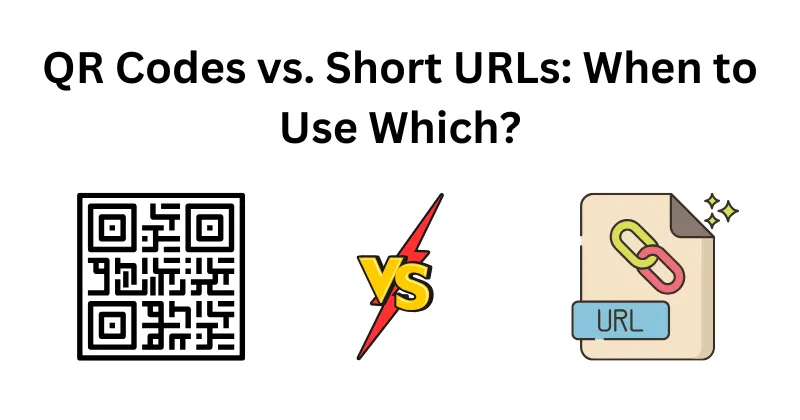In today’s digital world, sharing links quickly and efficiently is more important than ever. Two popular tools that help with this are QR codes and short URLs. Both are great for simplifying long website links, but they serve different purposes depending on the situation. If you’re wondering whether to use a QR code or a short URL, this article will explain the differences, advantages, and best use cases for each. By the end, you’ll know exactly when to use which tool to meet your needs.
What Are QR Codes?
A QR code, short for Quick Response code, is a type of barcode that can be scanned using a smartphone or QR code reader. When scanned, it directs the user to a website, displays text, or performs another action. QR codes are square-shaped and made up of black and white patterns.
For example, imagine you’re at a restaurant, and the menu is available online. Instead of typing a long website address into your phone, you can scan a QR code on the table, and the menu opens instantly. QR codes are especially useful for connecting the offline world (like posters or business cards) to the online world.
Advantages of QR Codes
- Fast and Convenient: Users can access a link with a single scan, without typing anything.
- Works Offline: QR codes are perfect for physical items like flyers, product packaging, or business cards.
- Customizable: You can add colors, logos, or designs to make QR codes visually appealing and on-brand. For example, tools like QR Code Generator allow you to create custom QR codes for free.
- Trackable: Many QR code tools let you track how many people scanned your code and where they are located.
Disadvantages of QR Codes
- Requires a Device: Users need a smartphone or QR code reader to scan the code.
- Not Ideal for Digital Use: QR codes are less practical for sharing links online, such as in emails or social media posts, because users can’t click them directly.
- Security Concerns: Some people hesitate to scan QR codes due to potential scams or malware. Always ensure your QR codes are from a trusted source.
What Are Short URLs?
A short URL is a shortened version of a long website address. For example, a long link like https://www.example.com/products/category/item12345?ref=abc can be shortened to something like https://bit.ly/3xyz. Short URLs are created using tools like Bitly or other URL shorteners.
Short URLs are commonly used in digital spaces, such as social media, emails, or text messages, where space is limited or where long links look messy. They make sharing links cleaner, easier, and more professional.
Advantages of Short URLs
- Perfect for Digital Sharing: Short URLs are ideal for emails, social media posts, or text messages because users can click them directly.
- Saves Space: On platforms like Twitter, where character limits are strict, short URLs help you stay within the limit.
- Branding Opportunities: Many URL shorteners let you create custom links, such as yourbrand.ly/offer, which builds trust and brand recognition.
- Trackable: Like QR codes, short URLs often come with analytics, so you can see how many people clicked the link and where they came from.
Disadvantages of Short URLs
- Not Offline-Friendly: Short URLs are not practical for offline use because users need to type them into a browser, which can lead to errors.
- Trust Issues: Some people avoid clicking short URLs because they can hide malicious links. Using a trusted URL shortener can help solve this problem.
- Less Visual Appeal: Unlike QR codes, short URLs don’t offer visual customization or design options.
When to Use QR Codes
QR codes are the best choice in situations where you need to bridge the gap between the physical world and the digital world. Here are some examples of when to use QR codes:
1. Offline Marketing
If you’re creating physical marketing materials, such as posters, flyers, or business cards, QR codes are a great way to direct people to your website. For example, a real estate agent might include a QR code on a “For Sale” sign that links to a virtual tour of the property. This saves the viewer from typing a long URL and makes the process quick and easy.
2. Events and Conferences
At events, QR codes can be used to share schedules, registration forms, or contact information. For instance, you could print a QR code on event tickets that links to a map of the venue. This is much more convenient than asking attendees to type a URL into their phones.
3. Product Packaging
Businesses often use QR codes on product packaging to provide additional information, such as user manuals, warranty details, or promotional offers. For example, a food company might include a QR code on a cereal box that links to recipes using their product.
4. Contactless Interactions
Since the rise of contactless technology, QR codes have become popular for things like restaurant menus, payment systems, and digital business cards. Scanning a QR code is faster and safer than exchanging physical items or typing URLs.
When to Use Short URLs
Short URLs are the best choice for digital environments where users can click links directly. Here are some examples of when to use short URLs:
1. Social Media Posts
On platforms like Twitter, Instagram, or LinkedIn, short URLs are essential for keeping posts clean and within character limits. For example, if you’re sharing a blog post, a short URL like bit.ly/blog123 looks much better than a long, messy link. It also leaves more space for your message.
2. Email Campaigns
In email marketing, short URLs make your emails look professional and organized. They also allow you to track how many people clicked your links, which is useful for measuring the success of your campaign. For instance, an online store might use a short URL to promote a sale, such as yourstore.ly/sale.
3. Text Messages
If you’re sending links via SMS, short URLs are a must because text messages have strict character limits. They also make it easier for recipients to read and click the link without errors.
4. Branded Marketing
If you want to build trust and brand recognition, short URLs are a great option. Many URL shorteners, such as Rebrandly, let you create custom links using your own domain name, like yourbrand.ly/offer. This makes your links look more professional and trustworthy compared to generic short URLs.
Can You Use Both Together?
Yes! In many cases, QR codes and short URLs can work together to cover both offline and online needs. For example, imagine you’re running a marketing campaign for a new product. You could:
- Create a short URL, such as yourbrand.ly/product, to share on social media, emails, and text messages.
- Use the same short URL to generate a QR code, which you can print on posters, packaging, or business cards.
This way, your audience can access the link easily, whether they’re online (clicking the short URL) or offline (scanning the QR code). Plus, if your URL shortener and QR code tool offer analytics, you can track both clicks and scans to measure the success of your campaign.
Key Differences at a Glance
To help you decide, here’s a quick comparison of QR codes and short URLs:
| Feature | QR Codes | Short URLs |
|---|---|---|
| Best for | Offline use | Online use |
| User Action | Scan with a device | Click or type |
| Customization | Colors, logos, designs | Custom domains |
| Space Efficiency | Takes up physical space | Saves digital space |
| Analytics | Tracks scans | Tracks clicks |
| Security Concerns | Risk of scams | Risk of hidden links |
Final Tips for Choosing the Right Tool
When deciding between QR codes and short URLs, ask yourself these questions:
- Where will my audience see the link?
If it’s in a physical location (like a poster or product label), use a QR code. If it’s in a digital space (like an email or social media post), use a short URL. - What action do I want my audience to take?
If you want them to scan something quickly without typing, use a QR code. If you want them to click a link directly, use a short URL. - Do I need analytics?
Both tools can provide analytics, but make sure you choose a trusted platform that offers detailed tracking for clicks or scans. - How important is branding?
If branding is a priority, consider using custom short URLs or designing QR codes with your logo to make them recognizable and trustworthy.
Conclusion
QR codes and short URLs are both powerful tools for sharing links, but they shine in different situations. QR codes are perfect for offline scenarios, where users can scan and go, while short URLs are ideal for digital spaces, where users can click directly. In many cases, combining the two can give you the best of both worlds, covering all your marketing and sharing needs.
Now that you understand the differences, you can make smarter choices for your business, marketing campaigns, or personal projects. Whether you’re creating a QR code for a flyer or a short URL for a tweet, the right tool will help you connect with your audience more effectively.
Ready to get started? Try generating your own QR codes or short URLs today, and see which works best for you!

